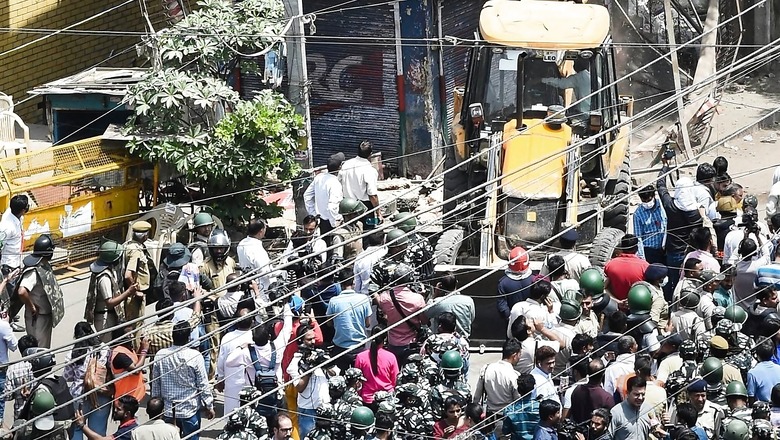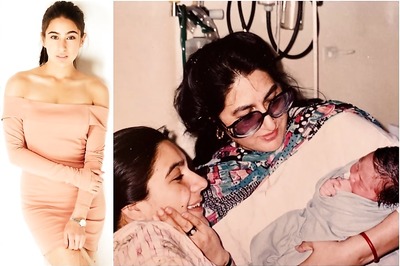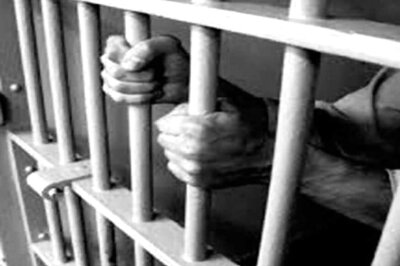
views
A range of political reactions have emerged after the horrific and illegal demolition campaign by the North Delhi Municipal Corporation in Jahangirpuri. One of the most bizarre reactions came from the ruling Aam Aadmi Party. The Arvind Kejriwal-led AAP claimed that the BJP had orchestrated the whole demolition and the communal violence through the illegal Bangladeshis and Rohingyas. Unfortunately, the capital’s ruling party has labelled Delhi’s Bengali-speaking Muslims as Bangladeshis. The chief minister of Delhi must acknowledge that not all Bengali-speaking Muslims are Bangladeshis. The Rohingyas do not speak Bangla or Bengali. The AAP has defamed Bengalis, Bangladeshis, Muslims and Rohingyas shamefully by taking this forbidden political stand.
Hours after the incident, Delhi’s Deputy Chief Minister Manish Sisodia said, “The BJP has created an atmosphere of anarchy in the country. You will get to know where the next riot will take place if the BJP gives a list of the areas where it has got Rohingyas and Bangladeshis settled illegally.” All the AAP leaders followed the same line and shared video messages on social media platforms.
ALSO FOLLOW: Jahangirpuri Violence LIVE Updates here
History of Bengali-speaking Muslims of Jahangirpuri
Jahangirpuri C and D blocks have homes of lower-class Muslim families who migrated to Delhi for jobs from West Bengal. This migration started during the post-Independence days. At the time, Bengal was going through a massive food crisis. The second batch of migrations happened during 1970s. Then, there was no Jahangirpuri. Most of these Bengali-speaking Muslim families used to stay in the Yamuna Pushta (Bank) area.
Later, the Congress government under Prime Minister Indira Gandhi resettled them. In a story published in the Morning Standard, former Delhi Development Authority Commissioner (Planning) A.K. Jain said, “During 1974-1975, Indira Gandhi was the Prime Minister and Jagmohan was the chairman of the Delhi Development Authority (DDA). She asked him that there should not be slums in the Yamuna river basin and that the people living there should be resettled.” Thereafter, the DDA allotted houses to these families in Jahangirpuri, Seemapuri, Trilokpuri and other areas.
The Bengali-speaking Muslims of Jahangirpuri are majorly from Midnapore, Murshidabad, Malda and South 24 Parganas districts. The old files of DDA and other agencies of the Delhi government will have these records.
Bengali-speaking Muslims are a Part of India
The issue here is the AAP’s erroneous perception of Indian demography, culture and Islam. In Bengal, Muslims constitute around 30 per cent of the state’s population. Majority of these Muslims are Bengali-speaking, but a small percentage of Urdu-speaking Muslims are also present in West Bengal. The Urdu-speaking Bengalis of West Bengal come from wealthy families and live mainly in urban centres. The Bengali Muslims of Bengal, on the other hand, are mainly concentrated in rural areas and adjacent districts of Bangladesh. The densely populated Muslim areas of Bengal are Murshidabad, Malda, Uttar Dinajpur, Birbhum, South 24 Parganas and Howrah districts.
The dialect in Bengal’s bordering areas with Bangladesh is similar because pre-Partition Bengal was undivided. For example, in many regions of Pakistan, people speak fluent Punjabi because, historically, those regions were part of India.
It is also pertinent to mention that Rohingyas are not Bengali-speaking Muslims. Linguistic studies have shown that the language of the Rohingyas has some similarities with the dialect of the Chittagong division of Bangladesh. But Bengali and the language of the Rohingyas are separate. It’s absurd to generalise different ethnicities.
Criminalising Minorities is Deplorable
The history of Partition is vast, and this is not the time to go into that history. But when the ruling party in a city-state and its deputy chief minister along with elected MLAs criminalise Bengali-speaking Muslims, they criminalise an indigenous community. The Delhi chief minister and the Aam Aadmi Party must know that the Bengali-speaking Muslims who did not go to Bangladesh post-Independence chose India as their country. Labelling them Bangladeshi immigrants is shameful and exposes the xenophobia of the AAP.
The AAP has alleged that the BJP has settled the Bengali-speaking Muslim families in Jahangirpuri. The political whataboutery can go on. The AAP won the Adarsh Nagar constituency twice after Arvind Kejriwal was elected as Delhi’s chief minister. The Jahangirpuri area comes under this constituency in North West Delhi. Kejriwal’s party, so far, had never raised the issue of the ‘illegal’ electorate in the area. So, if the BJP has benefitted from the alleged illegal immigrants, the AAP is no different.
ALSO READ | Opinion | Provocation Theory Will be Death Knell for Not Just Hindus but Also Indian Democracy
BJP or AAP: Who Brought the Bangladeshi Theory to Jahangirpuri?
Several AAP spokespersons have claimed that it was the BJP that had first accused the AAP of providing free electricity and water to the Bangladeshi and Rohingyas of Jahangirpuri. The AAP spokespersons maintained that their statements were an attempt to expose the lies of the BJP.
There is no doubt that the AAP’s statement is impetuous and disgraceful. It makes no difference whether or not it was the first to claim this — the repercussions are resentful. The minorities of India are neither mere vote banks nor punching bags. Today, the Bengali-speaking Muslims of Jahangirpuri are at the receiving end. They are poor and earn their living mostly as daily wagers, sanitation workers or as house helps. Painting them as illegal migrants can deny them of even their meagre means of earning a livelihood.
The AAP proudly speaks about its welfare work in education, health, power and other sectors. The people of Delhi and Punjab have approved their welfare politics and brought the party to power. However, just as the right to education and healthcare are fundamental, so is the right to live with dignity.
Article 29 of the Constitution mandates that no discrimination be done on the grounds of religion, race, caste or language. Article 29 was part of the draft constitution submitted by Dr B.R. Ambedkar. It is high time for the AAP, which has been celebrating Ambedkar, to revisit its stand on wrongfully criminalising minorities. Finally, smearing a community is both offensive and vile. The Bengali-speaking Muslims of West Bengal are neither Rohingyas nor Bangladeshis; they are just as much Indian as anyone else.
The author is an independent journalist based in Kolkata and a former policy research fellow at the Delhi Assembly Research Center. The views expressed in this article are those of the authors and do not represent the stand of this publication.
Read all the Latest Opinions here















Comments
0 comment